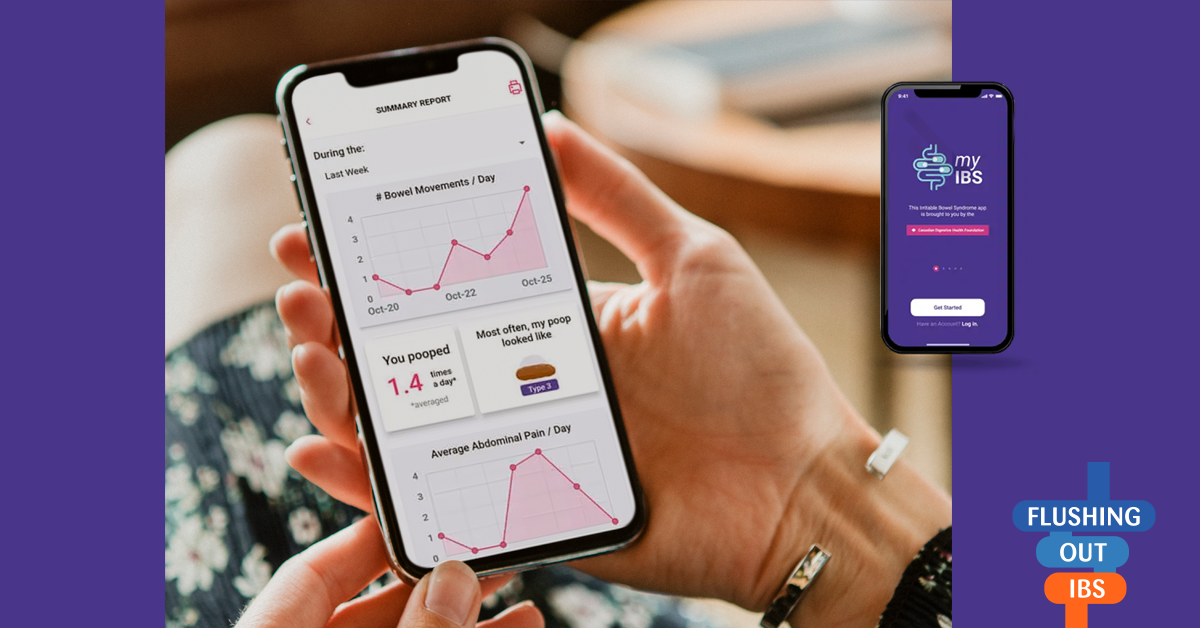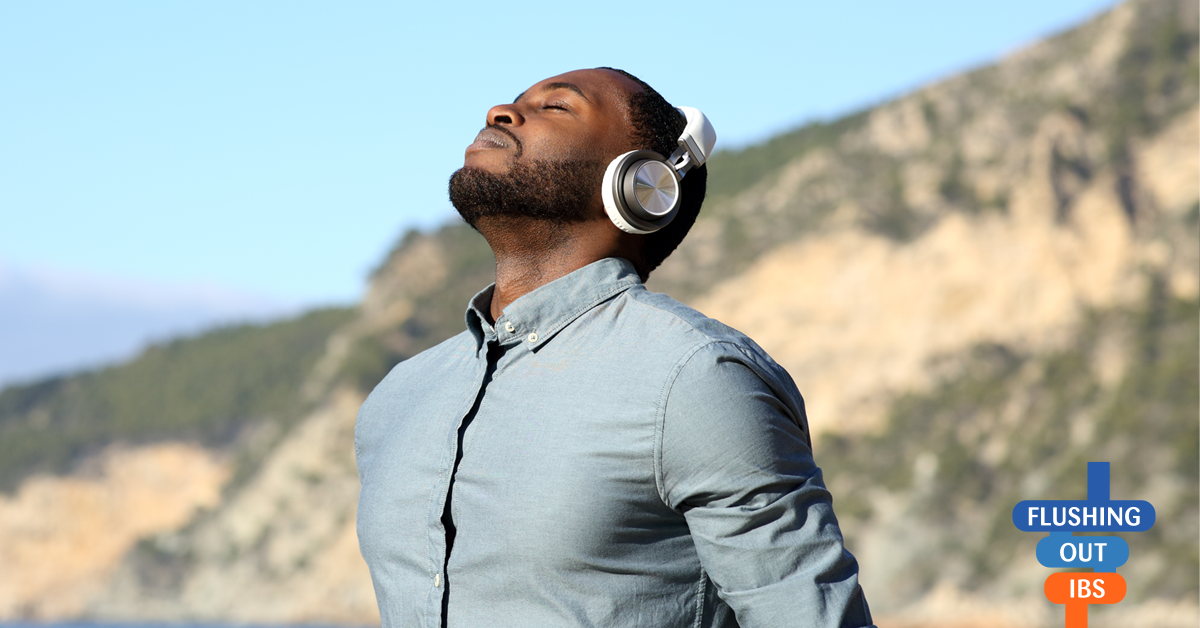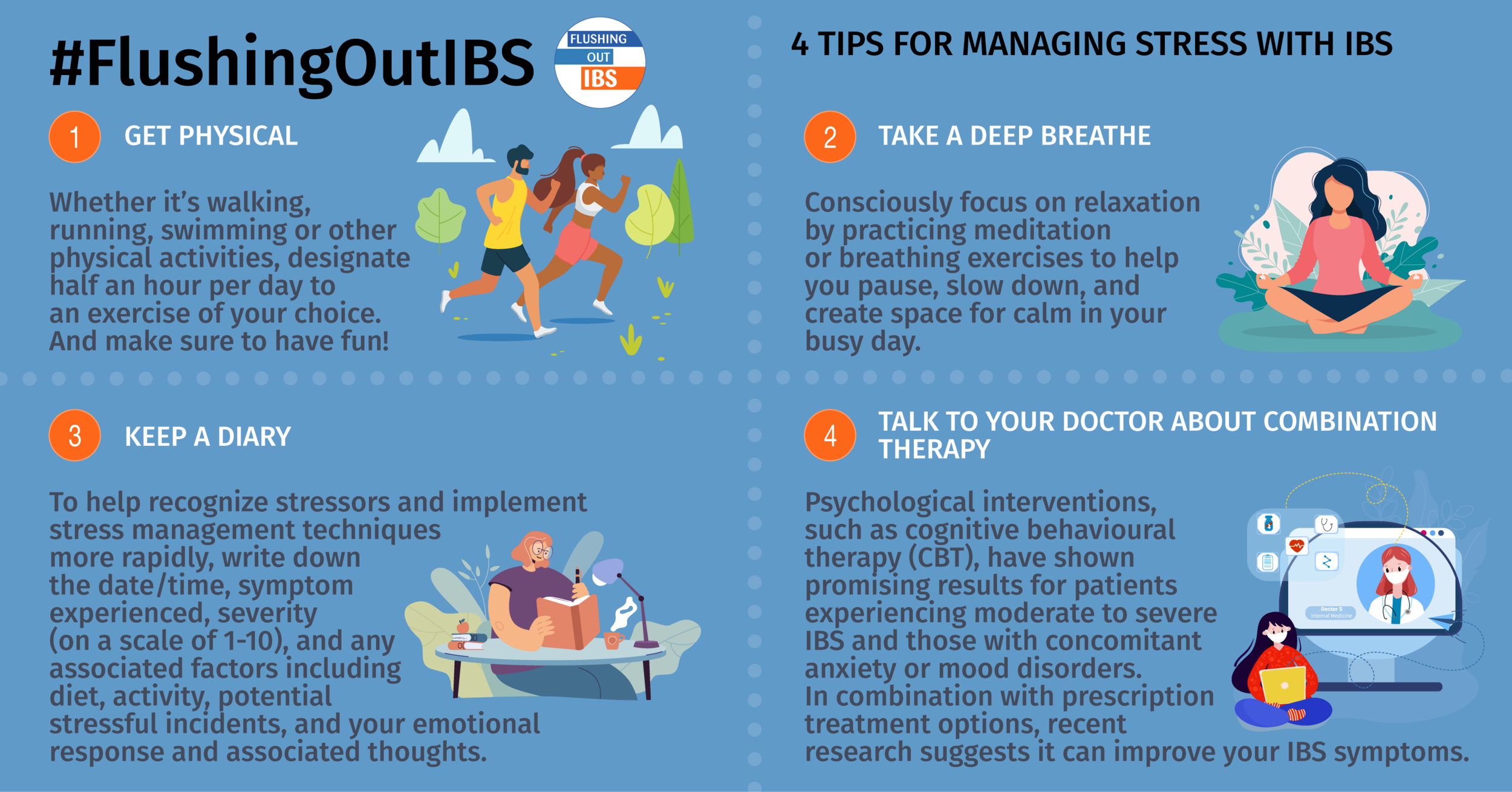IBS symptoms can vary from person to person, there’s no “one size fits all” treatment. IBS treatment often includes diet and lifestyle changes; fibre supplements; probiotics and medications. Because IBS is multifactorial and the root causes may vary from one individual to the other, talk to your doctor to help determine a treatment plan that is right for you.
Could an app help me manage my irritable bowel syndrome symptoms?
Yes! Apps are very good tool to use, and there are several available to help you manage your IBS symptoms.
We recommend the one from the Canadian Digestive Health Foundation.
The myIBS app is free, easy to use and very comprehensive – allowing you to digitally log your symptoms, bowel movements, food, sleep, stress and more, to help you better understand and manage your IBS.
Tip: Use this app to help you have more detailed discussions with your doctor.
If you haven't already, download the app by searching for "myIBS" in your App Store/Google Play Store.
#flushingoutIBS
Tips for managing your IBS while traveling
Relax your brain-gut connection
Take advantage of your vacation to reduce your stress and soothe your brain-gut connection, which plays an important role in managing your irritable bowel symptoms.
To put yourself in a good state of mind, take the time to do daily meditation and breathing exercises; you can download applications before your departure to bring with you.
If you have symptoms of irritable bowel syndrome such as abdominal pain, bloating, constipation and/or diarrhea, talk to a doctor right away.
#flushingoutIBS
Tips for managing your IBS while traveling
Combine useful and enjoyable activities by visiting local markets
Discovering local markets is a great sensory experience. In addition to meeting local producers and discovering regional specialties, it allows you the opportunity to choose fruits, vegetables, or other foods that you like and tolerate very well.
If you have symptoms of irritable bowel syndrome such as abdominal pain, bloating, constipation and/or diarrhea, talk to a doctor right away.
#flushingoutIBS
Myth: IBS Is No Big Deal
IBS is a chronic condition that can affect your career, your relationships, and almost every part of your life. There's still a lot of confusion about IBS, including what it is and how best to treat it. So, it's easy for misconceptions about the condition to sound like facts. IBS is in fact an unpleasant and often debilitating condition, characterized by frequent, recurrent abdominal pain, as well as problems with constipation and/or diarrhea. People with IBS often experience a strong urge to use the bathroom and may avoid going to places without easy access to one. People with IBS also start to fear and avoid many foods believed to trigger IBS attacks, often leading to loss of pleasure in eating as well as reduced opportunities to socialize.
#flushingoutIBS
How to Exercise with IBS?
IBS symptoms can interfere with your daily life, and they may last for days, weeks, or months. There is no quick fix when it comes to IBS. However, for some people, certain lifestyle habits can help manage symptoms. This includes regular physical activity. Exercise is thought to ease IBS symptoms by minimizing stress, improving bowel function, and reducing bloating by stimulating the release of endorphins, leading to a greater sense of calm and healthy living. Regular exercise could also help relieve stress, improve sleeping habits, and develop a better sense of well-being. This increased fitness may help you feel stronger and more capable of handling painful IBS flares.
#flushingoutIBS
How to Manage Your Stress When You Have IBS
Stress is a common trigger for IBS at any age, and patients with IBS that is triggered by stress can benefit from learning stress management techniques, getting counseling, and getting regular physical activity. Adding an exercise regime to your IBS treatment plan can help in a number of ways. First, exercising releases endorphins, which help reduce pain and boost pleasure, resulting in a feeling of well-being. Second, exercising may strengthen the body, and the cardiovascular system, thus improving overall health. For IBS sufferers, low-impact activities such as walking, jogging, leisurely biking, and swimming are great options. Also, low-impact aerobics, stretches, and yoga can also help you manage your symptoms.
#flushingoutIBS
Stay Updated About IBS
Several clinical studies have shown that the onset of psychiatric disorders often precedes, or occurs concurrently, with IBS symptom onset.
While IBS is not a psychiatric disorder, emotional distress, traumatic life events and negative coping mechanisms may play a significant role in the progression of IBS. Of all psychiatric disorders, IBS patients most frequently experience depression and anxiety, in addition to higher rates of co-morbidity with other disorders such as fibromyalgia, chronic fatigue, and pelvic pain.
Check out these 4 tips for managing stress to help you live your best life and #FlushOutIBS!
You’re not alone in facing IBS
When at the doctor’s office, it’s important not to feel embarrassed or stigmatized by an IBS diagnosis. Did you know that 18% of Canada’s population suffer from IBS symptoms, with a majority of them indicating that their symptoms interfere with their everyday life? Know that you’re not alone in facing IBS. Don’t be afraid to discuss any pain or symptoms that have been bothering you, even if it’s embarrassing. Your doctor’s job is to help you feel better and protect your privacy. Most doctors’ visits are short, so it’s important to prioritize your concerns by setting an agenda. Be open to different treatment options, as no single treatment might work for everyone. If you’ve already tried diet and other lifestyle changes, ask your doctor if prescription medication for IBS could help relieve your symptoms.
Talk to Your Doctor
Discussing IBS Treatment Options with Your Doctor
Once you’ve been diagnosed with IBS, your doctor will initiate a conversation with you about IBS treatment options. When talking to your doctor about available therapies, ask questions and take notes.
Some questions you might consider asking include:
How will this treatment option help with my symptoms?
Are there any potential side effects to this treatment option?
How long will I have to follow this treatment plan?
Are there any alternative treatments? If yes, are they equally effective?
Don’t hesitate to voice your concerns and questions, and ensure they are answered in a timely manner and in a way that is clear to you.
COVID19 and the Illusion of Controlled IBS
After a whole year of lockdown, most of us have now settled into a “new normal” and the initial stressors of the pandemic have subsided. This may mean that IBS sufferers may have become complacent about managing their IBS. Being unable to go into the office, or journey far at all, may have minimized IBS symptoms, creating the illusion that the condition is improving. Consequently, IBS suffers may be feeling less burdened by their IBS, and so may not be seeking treatment.
One of the best ways to stay healthy is to get regular checkups. Remember, many doctors are making telemedicine available to their patients, allowing you to video chat or talk on the phone with a health care professional, instead of going into the office.
IBS and the Great Gender Divide
Did you know that IBS is significantly more common among women than men, with 2 to 3 times as many women being diagnosed with the condition compared to men?
Studies have also shown that women may experience IBS differently than men. For instance, women report more non-pain associated digestive symptoms, such as bloating, nausea, and constipation. Women also experience more non-digestive symptoms, such as migraines and chronic fatigue syndrome. Lastly, women’s IBS symptoms tend to change throughout their menstrual cycle, with more frequent and severe symptoms, such as loose stools and bloating, occurring during menstruation.
If you or anyone you know is experiencing these symptoms, it’s important to speak to a doctor right away. While IBS is not curable, treatment can help lessen symptoms. Therapies may include medicines, supplements, dietary changes, and exercise.
Practical Tips for At-home Management of IBS During a Pandemic
Although we’re now more than a year into the pandemic, let’s consider some practical at-home IBS management tips.
Try eating at regular time intervals and keeping a log of everything you eat.
Try to also keep a diary of any associated symptoms.
Remember to exercise regularly and drink plenty of fluids.
Consider taking probiotics and/or eating probiotic-rich foods (e.g., kimchi, kefir, and kombucha),
Remember the root cause of IBS is often due an imbalance in gut bacteria. Be sure to talk to your doctor about medications that act on gut bacteria to help alleviate your IBS symptoms.
Stress and IBS
Let's take a moment today to breath and let go of any stress going into the upcoming week. In a recent study, it was found that both anxiety and depression not only increase the chances of developing IBS, but people with IBS are more likely to suffer from anxiety and depression.
If you suffer from IBS, here are several ways to manage your stress:
Push for a firm diagnosis from your doctor, or seek out a second opinion
Be open about your condition to your family, friends, and colleagues
Exercise regularly
Take time for yourself
To learn more about these and other stress management tactics, visit: https://cdhf.ca/health-lifestyle/the-importance-of-managing-stress-for-people-who-suffer-from-ibs/
Seeing a doctor
When should you see a doctor for IBS? Pain in the abdominal area is the most common reason people see a doctor. Typically, IBS is characterized as recurrent abdominal pain or discomfort that occurs at least 3 days per month, in the last 3 months, and improves with bowel movement. Some patient advocacy groups recommend seeing a physician if unexplained gastrointestinal symptoms continue for more than a month.
Other gastrointestinal symptoms may include diarrhea, constipation, bloating, gassiness, mucus in the stool and nausea.
If you need to see a doctor, remember many doctors are making telemedicine available to their patients, allowing you to video chat or talk on the phone with your healthcare provider.
Exercises You Can Do at Home
For IBS suffers, low impact exercises have many health benefits. Exercise is important, not only to help manage stress, but also to help massage digestive organs and improve gas clearance.
Here are some ways to stay active and pick up your daily pace, even if you’re working at home!
Going for short walks
Low-impact aerobics
Stretching exercises
In-door cycling
What medications are available for IBS?
IBS (particularly IBS-D) is caused by several different factors, including stress, dysbiosis, certain foods, and other factors. Several types of medications are available to treat IBS, and these are intended for specific use under a doctor’s supervision. Medications for IBS include rifaximin, an antibiotic formulated to fight bacterial infection only in the intestines, and eluxadoline, formulated to address problems associated with IBS-D, such as diarrhea and abdominal pain, by slowing down the movement of food during digestion.
There are other prescription medications and supplements available to treat IBS. To know which medication and/or supplement is right for you, speak with your doctor.
Medicalizing IBS
In addition to diet and lifestyle management, there are several types of newer medications that have been shown to be effective in treating IBS-C and IBS-D. Note, these are prescription medications, intended for specific use under a doctor’s supervision.
Therefore, it is important to speak to a doctor or to a gastrointestinal specialist, if you have IBS or symptoms of the disease, particularly since it can lead to more serious underlying conditions. Many doctors and clinics are making telemedicine available to their patients, allowing you to video chat or talk on the phone with a health care professional, instead of going into the office.
Managing Irritable Bowel Syndrome (IBS)
Managing Irritable Bowel Syndrome (IBS) symptoms often takes a combination of approaches and each person is different! What works for one person, may not work for another.
Visit this link to learn about proactive strategies and treatment options that can help you live your best life!
Disclaimer: Before making any changes in your therapy, diet or exercise program you should consult your health care professional to discuss the impact these changes may have.
IBS exercise
It has been said before – stress is a major driver of IBS symptom flares. There is also no doubt that the effects of COVID-19 are immense and may induce additional stress, anxiety, or depression. Adding an exercise regime to your IBS treatment plan can help in a number of ways. First, exercising releases endorphins, which help reduce pain and boost pleasure, resulting in a feeling of well-being. Second, exercising may strengthen our body, and our cardiovascular system, thus improving our overall health.
For IBS sufferers, low-impact activities such as walking, jogging, leisurely biking, and swimming are great options. Also, low-impact aerobics, stretches, and yoga can also help you manage your symptoms. There is still plenty of time to have some fun outdoors before winter weather rolls in!
IBS solutions
Although IBS is a chronic, often debilitating, disorder with no cure, there are several therapeutic options available. Visit https://badgut.org/information-centre/a-z-digestive-topics/ibs/ to learn more about IBS symptoms and IBS treatment options, and to take a 30-second IBS test.
If you think you have IBS, you are not alone. IBS may affect as many as 13-20% of Canadians at any given time. Sadly, many are too embarrassed to speak to their doctor about their symptoms and seek out the help they need. We understand it can be difficult, and so, here are some tips:
Build a partnership with your doctor. View them as a companion that is there to help you manage the condition and regain control of your life – not someone who will judge you for your circumstances.
Be clear about your symptoms and what you want help with. It helps to write down some IBS management goals prior to your consultation.
Aspects of IBS can be complex. If you do not understand something, ask for clarification.
Exercise and activities
Did you know that during IBS flare-ups, gentle or low-impact activities such as walking, yoga, and light cycling can help reduce stress and manage your symptoms?
Check out the following link for some lifestyle changes for IBS, including exercises: https://cdhf.ca/digestive-disorders/irritable-bowel-syndrome-ibs/living-positively/
Starting the dialogue
In engaging with a doctor to speak about IBS, it is important that the physician knows or can access your medical history (given that IBS generally persists over time). Likewise, it is important to have a doctor that can empathize with your discomfort and can recognize the importance of your symptoms. Your doctor should be ready to work with you, potentially over the long term, to help you manage your IBS. If you feel you are unhappy with your doctor’s approach, express your dissatisfaction to try and remedy the situation. Also, do not be afraid to seek a second opinion about your diagnosis or treatment plans.
Coping with COVID/Returning to work Stress
Most provinces and territories have been releasing plans for easing restrictions that were put in place to limit the spread of COVID-19. One of the biggest concerns for IBS sufferers is the added stress of returning to work after the lockdown. IBS has long been thought of as a stress-related disorder and can trigger a wide range of gut symptoms including heartburn, nausea, bloating and changes in bowel pattern.
If you are feeling overwhelmed, it is important to ask your doctor about ways to manage your IBS. Many doctors are making telemedicine available to their patients, allowing you to video chat or talk on the phone.
Your doctor can help you
Although there is no cure for IBS-D, there are ways to manage IBS-D and dysbiosis. Symptoms of IBS can be improved by treatments that target the microbiota (e.g. medication and pre- and probiotics), improving dietary habits (e.g. eating a balanced, nutritious diet), and engaging in mind/body techniques for stress management.
If you suffer from IBS, then the first step is to have a medical examination by a family physician or gastroenterologist. Currently, it is estimated that only about 40% of those who have IBS symptoms seek help from a physician.
Below are 4 quick tips for preparing for your doctor's visit:
- Keep and bring in your symptoms diary
- Prepare your medical history
- Bring in a list of any medications you are taking
- Make a list of your specific worries and concerns
Diagnosed with IBS? Here is a good start to help your microbiome:
1. Try a low FODMAP diet first to reduce symptoms.
2. Eat prebiotic rich foods once symptoms resolve.
For more information, visit: https://cdhf.ca/health-lifestyle/understanding-fodmaps/



























